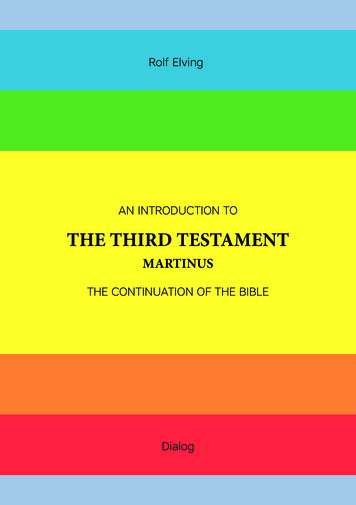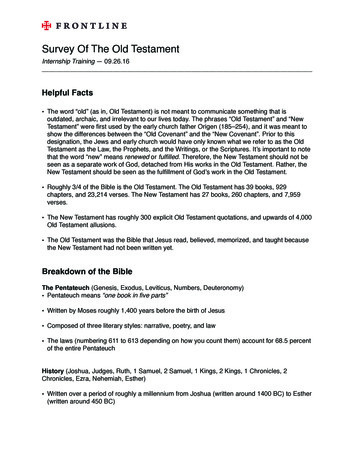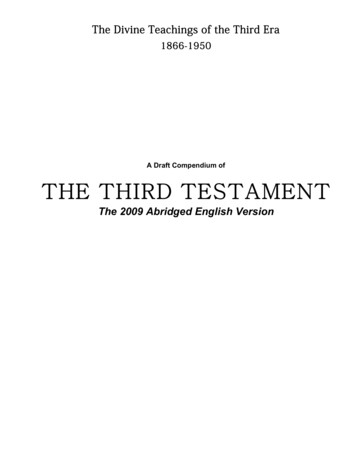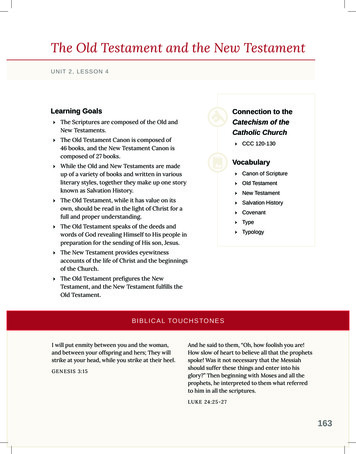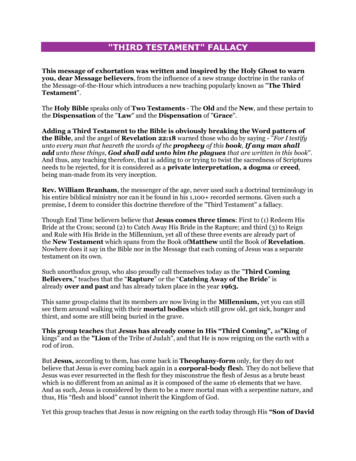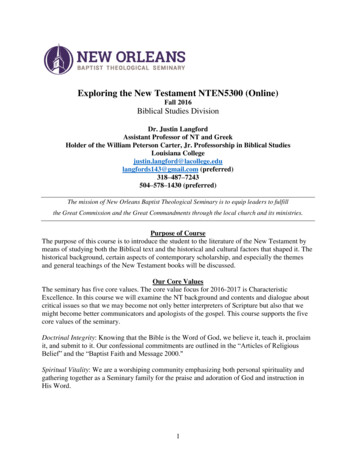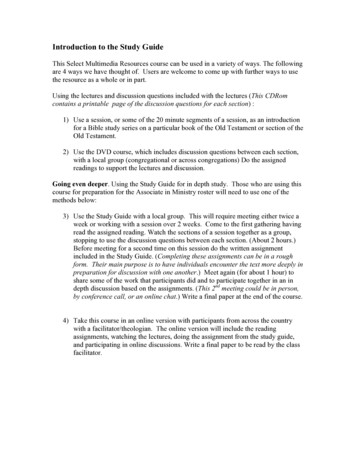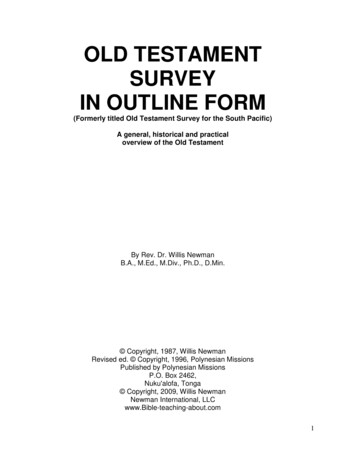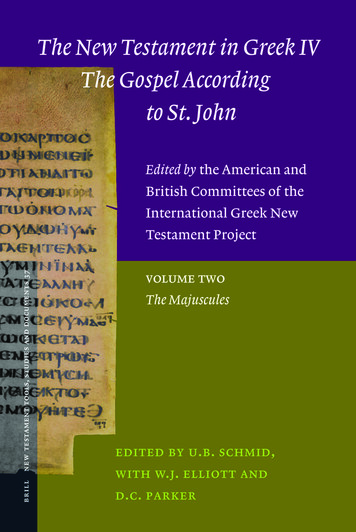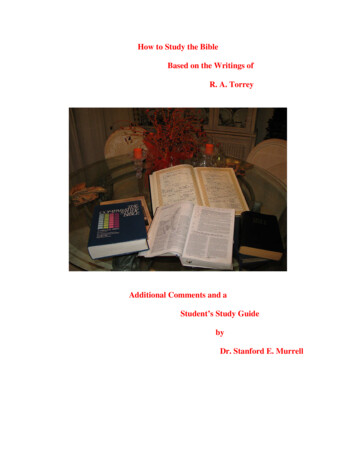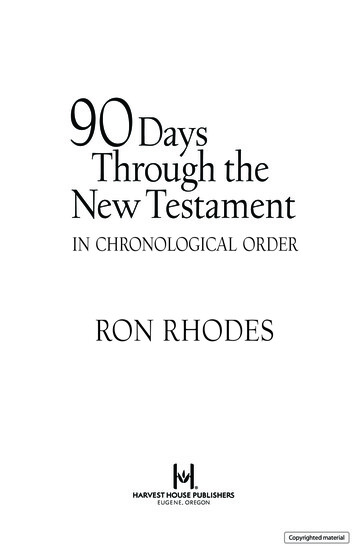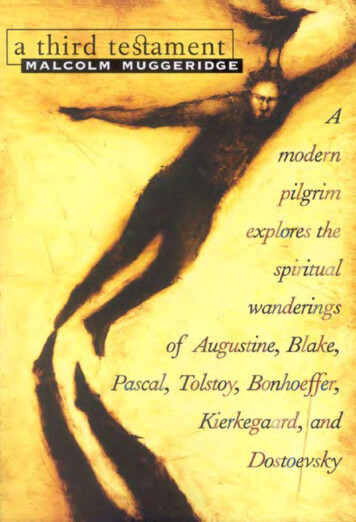
Transcription
a third testamentmalcolm muggeridgeA modern pilgrim explores thespiritual wanderings of Augustine,Blake, Pascal, Tolstoy, Bonhoeffer,Kierkegaard, and Dostoevsky
Please share this e-book with your friends. Feel free to e-mail it orprint it in its entirety or in part, but please do not alter it in any way. If youwish to make multiple copies for wider distribution, or to reprint portions ina newsletter or periodical, please observe the following restrictions: You may not reproduce it for commercial gain.You must include this credit line: “Copyright 2007 byPlough Publishing House. Used with permission.”This e-book is a publication of Plough Publishing House, Farmington, PA15437 USA (www.plough.com) and Robertsbridge, East Sussex,TN32 5DR, UK (www.ploughbooks.co.uk)Copyright 2007 by Plough Publishing HouseFarmington, PA 15437 USAAll Rights ReservedCover artwork by Max Grafe / Levy Creative Management
contentsintroduction vsaint augustine 1blaise pascal 16william blake 31søren kierkegaard 50fyodor dostoevsky 67leo tolstoy 85dietrich bonhoeffer 103afterword 119the author 120
introductionNo, no, no! Come, let’s away to prison:We two alone will sing like birds i’ the cage And take upon’s the mystery of thingsAs if we were God’s spies.King LearIt often happens that the reason for doing something only emergesclearly after it has been done, conscious intent and all the variouspracticalities which go therewith being but the tip of an iceberg ofunconscious intent. In any case, as has often been pointed out, time itselfis a continuum, and not divisible into past, present and future tenses.Thus, it was only after the completion of the series of television pro grams whose scripts are here collected, when I was asked to explain why Ihad chosen Saint Augustine, Blaise Pascal, William Blake, Søren Kierke gaard, Fyodor Dostoevsky, Leo Tolstoy and Dietrich Bonhoeffer to betheir subjects, that I fully grasped the theme to which they all belonged.Previously, I had seen them singly and separately as seven characters insearch of God, and as such of great interest, and a formative influencein my own thinking and questing.Considering them as a group, it became clear to me that, althoughthey were all quintessentially men of their time, they had a special rolein common, which was none other than to relate their time to eternity.This has to be done every so often; otherwise, when the lure of self-suf ficiency proves too strong, or despair too overwhelming, we forget that
introductionvimen need to be called back to God to rediscover humility and with it,hope. In the case of the Old Testament Jews, it was the prophets whothus called them back to God – and when were there more powerfuland poetic voices than theirs? Then came the New Testament, which isconcerned with how God, through the Incarnation, became His ownprophet. Nor was even that the end of prophets and testaments. Be tween the fantasies of the ego and the truth of love, between the dark ness of the will and the light of the imagination, there will always be theneed for a bridge and a prophetic voice calling on us to cross it. This iswhat my seven seekers after God were destined to provide, each in hisown way and in relation to his own time.So I came to see them as God’s spies, posted in actual or potentialenemy-occupied territory, the enemy being, of course, in this particularcase, the Devil. As it happens I was myself involved in espionage opera tions in the Second World War, when I served with MI6, the wartimeversion of the British Secret Service, or SIS. We had, for instance, whatwere known as stay-behind agents in German-occupied France, whowere required to lie low until circumstances arose in which they couldmake themselves useful by collecting and transmitting intelligence, ororganizing sabotage. While they were waiting to be activated, it wasessential that they should make themselves inconspicuous by merginginto the social and political scene, and, in their opinions and attitudes,echoing the current consensus. Thus, it would be appropriate for a staybehind agent posted in, say, Vichy France, to be ostensibly Pétainist inpolitics, Catholic in religion, and bourgeois in way of life, eschewingany association with resistance organizations and, equally, the morefervid pro-Nazi ones. By this means he might hope to establish himselfas a loyal supporter of Marshal Pétain, and so, when the time came, bethe better placed to act effectively on behalf of the belligerent Gaullistsand their Anglo-American allies.A Third Testament
introductionviiThose who direct our intelligence services are not blessed with theinsights and vision of God – though they are sometimes prone to supposeso. Nor are our human calamities in God’s eyes what they seem to be inours. There is no imagery that can convey even the similitude of God,let alone forecast His purposes; to know Him at all we are beholden tothe great mercy of the Incarnation. Even so, in considering the placeof a Saint Augustine in history, it is possible to see his role as that of astay-behind agent posted by a celestial spymaster in a collapsing RomanEmpire with a brief to promote the Church’s survival as custodian of theChristian revelation. Certainly, no one could have been better qualifiedfor such a role than the famous Bishop of Hippo, ardent, as he was, forRoman civilization as only a North African could be, and ardent forCatholic orthodoxy as only a convert and sometime Manichean hereticcould be.* His worldly credentials were impeccable – a highly successfulprofessorship of rhetoric at Milan University, which in his regeneratedays he called his Chair of Lies, friends and acquaintances in the high est circles and occasional speech-writing jobs for the Emperor himself.As for his pièces justificatives, as the French police call supporting docu ments, who could ask for anything better than his Confessions, the firstgreat autobiography and still reckoned among the greatest, and his Cityof God, which laid down the guidelines for Christians, first to survive,and then to set about building a new great civilization to be known asChristendom?When Augustine came to die, the barbarians were already at thegates of Hippo, and were pillaging and burning the city while his bodylay in his basilica awaiting burial. His services on behalf of his Church,however, by no means ended with his life, but continued through thesucceeding Dark and Middle Ages, defining and strengthening the faith*Manicheism, to which Augustine adhered for some nine years before his conversion, was based on thenotion of an eternal conflict between light and darkness. Its followers were expected to practice extremeasceticism.A Third Testament
introductionviiihe had so cherished, thereby facilitating its movement westward to leavein its train great cathedrals like Chartres to mark its progress.If St. Augustine appeared today, and had as little authority as his defenders,he would achieve nothing. God guided His Church well by sending himearlier, and investing him with the proper degree of authority.Thus wrote Blaise Pascal some ten centuries after Augustine’s death. Bythat time new dangers were threatening. The great torrent of creativityreleased by Christianity now looked as if it were overflowing its banks,sweeping aside the dikes and dams designed to hold it back. In place ofthe Cloud of Unknowing between God and us, a Cloud of Knowing wasgathering; now, the threat was of light, not darkness – a dazzling, blindinglight. This time God’s finger pointed inexorably at Pascal himself. He itwas who would be required to counteract a two-fold attack: on the onehand, a clamor for self-indulgence, freedom from all restraint, licenseto, in his own words, “lick the earth”; and, on the other, the first crazyrumblings of godless men of science, so blown up with pride in their ownachievements and the staggering potentialities thereby opened up, thatthey were beginning to think they were gods themselves, capable of shap ing their own destiny and creating a kingdom of heaven on earth.Pascal’s credentials as God’s spy in these particular circumstances wereno less impeccable than Augustine’s had been in the situation createdby the fall of Rome. Ostensibly, he was supremely a man of his time; byvirtue of his mathematical and scientific attainments in the same class as aNewton, as a thinker on equal terms with a Descartes, and as a polemicistand stylist equipped to aim effective barbs at a Montaigne. As a Jansenist*sympathizer, Pascal was deep in the controversies raised by the Reforma tion, and came within an ace of being excommunicated– something,*Jansenism, a heresy derived from the Augustinianism of Cornelius Jansen, in Pascal’s time Bishop ofYpres. It holds that grace is irresistible, and has therefore been regarded as deterministic and in line withCalvinism. Its followers, who included the religious of Port Royal, among them Pascal’s sister Jacqueline,practiced extreme asceticism.A Third Testament
introductionixincidentally, liable to happen to God’s spies at all times, whether atthe hands of the Inquisition, political police, or, the latest variant, theMedia Pundits. His Lettres provinciales, venomously attacking the time serving Jesuits, were by universal consent a masterpiece of demolitionand irony, and all in all there seemed every reason for regarding himas an outstanding and characteristic product of the Renaissance and aharbinger of the Enlightenment to come.Yet all this amounted only to what Pascal called “distractions,” in tended, as he put it, “to amuse us and bring us imperceptibly to death.”The divine briefing had already taken place, and he knew just what hehad to do, which was no less than to use every scrap of knowledge hehad acquired, his scientific explorations and experimentations, all thegifts of the intellect and the imagination God had endowed him with,to produce his great masterpiece, his superb apologia for the Christianfaith itself, posthumously named his Pensées. Furthermore, by a signalgrace, due to his early death at thirty-nine, this splendid exercise infaith at its most durable and thought at its most perceptive, was leftbehind him in the form of notes on scraps of paper rather than thelong, conscientiously worked over, and possibly tedious, treatise he hadenvisaged.The notes, revealing, as they do, the working of his brilliant mind,have been uniquely effective in their impact; personnel bombs explodingunpredictably instead of with a single devastating blast. Furthermore,the impossible task of putting the notes together in the order Pascal maybe presumed to have intended has kept scholars busy who might oth erwise have turned their attention to form-criticism and reinterpreting,rather than just rearranging, what Pascal wrote. If only some similarlyblameless exercise had occupied contemporary biblical scholarship,especially New Testament commentators, the Bultmanns and Kungsand Robinsons, what a blessed deliverance that would have been! ItA Third Testament
introductionxwas surely significant that Pascal’s worldly achievements should haveincluded inventing the computer, which has become twentieth cen tury man’s topmost graven image, before which he readily prostrateshimself, and whose cryptic utterances he receives like Delphic oracles.Pascal’s services as God’s spy were correspondingly illustrious – no lessthan the exposition and celebration of the true Christian faith in wordsso luminous that they have continued to shine with their own innerlight ever since, like an El Greco portrait.I turn my eyes to the Schools & Universitiesof EuropeAnd there behold the Loom of Locke,whose Woof rages dire,Wash’d by the Water-wheels of Newton:black the clothIn heavy wreathes folds over every Nation:cruel WorksOf many Wheels I view, wheel withoutwheel, with cogs tyrannicMoving by compulsion each other, not asthose in Eden, which,Wheel within Wheel, in freedom revolve inharmony & peace.These lines from William Blake’s Jerusalem were written about a cen tury and a half after the Pensées, and in Blake’s inimitable way convey asense similar to Pascal’s that knowledge is but a vast cul-de-sac, and thetechnology derived from it a dread servitude – cogs tyrannic moving bycompulsion instead of revolving in harmony and in peace as in Eden.No two human beings could have been more different in their back grounds and pursuits, in their social position and upbringing, and inthe times in which they lived, than Blake and Pascal. Yet they stood sideby side in their common awareness of the enormous dangers arisingA Third Testament
introductionxifrom man’s venturing into the Cloud of Knowing. Pascal reached theconclusion that the only serious quest here on earth was for God, andthat the way to Him was chartered in the Old Testament, sign-postedin the New, and illumined by faith. Blake likewise was insistent thatonly the imagination was capable of grasping what life was about, andhe never tired of belaboring the ideologues of the age, like Rousseauand Voltaire and Newton, or of pouring scorn on the contemporarywisdom – for instance, Locke on Human Understanding and Bacon onthe Advancement of Learning.Only God would have dared to recruit so strange, inspired and erratica person as Blake to sit out on His behalf the tumultuous years and af termath of the French Revolution and its literary and artistic equivalent,the romantic movement. Among many of his contemporaries he passedfor being mad, and in his ways and statements was so incalculable andeccentric as to be what, in human terms, is called a security risk. God,however, sees further in selecting His stay-behind agents than mortalspymasters do, and knew that His arch advocate of exuberance and excesswould make of Jesus’ gospel of love and self-abnegation a bright rainbowshining across a stormy sky, keeping alive the hope of deliverance fromdark satanic mills of every variety, and all their lies and pollution.Like Pascal, Blake was a man of his time; temperamentally a revo lutionary himself, who rejoiced when the Revolution happened, worethe red cap of the Liberty Boys in the streets of London until the Reignof Terror led him to lay it aside, and frequented the table of JosephJohnson, the publisher, where he met such revolutionary luminaries asWilliam Godwin and Tom Paine, not to mention Joseph Priestly, thediscoverer of oxygen, whom he immortalized as Inflammable Gas theWind-Finder. He also had a passing relationship with Mary Wollstone craft, known as the hyena in petticoats, who fulfilled his notion of Fear ful Symmetry by becoming the wife Godwin deserved, and producingin their daughter Mary, the wife Shelley deserved.A Third Testament
introductionxiiBlake also belonged temperamentally to the romantic movement.Indeed, he may be said to have ushered it in with his glowing versesand paintings, which owed nothing to any fashion or school, and whichmany consider, as I do, to be its finest product. These writings andpictures remain in all their beauty and spiritual awareness to offset thetawdry offerings of later romantic artists and poets, all moving towardstotal mindlessness and incoherence – a Devil’s Logos whereby the Wordbecame flesh to dwell among us, graceless and full of lies.Over in Denmark, of all places, another prophetic voice was to beraised – Søren Kierkegaard’s – to echo, and project still further into thefuture, Pascal’s and Blake’s. Kierkegaard knew and admired Pascal’swritings, but though his life overlapped with Blake’s (he was fourteenwhen Blake died), it is extremely improbable that he ever heard tellof him. What he and Blake had in common was a detestation of thesort of materialist-collectivist society they saw coming to pass aroundthem, and an uncanny awareness of the sinister potentialities of sci ence. They were even alike in their oddity, which set them apart fromtheir contemporaries; in their resolute determination to go their ownway without making concessions to the collectivity. Seeing them interms of their predecessors, the Hebrew prophets, Blake was Isaiah andKierkegaard, Amos; both their voices being raised in warning againstthe wrath to come if men decided to dispense with God and establishHis Kingdom here on earth, with appropriate laws and morality andecclesiastical establishments.Of all God’s spies, a motley enough crew anyway, Kierkegaard issurely one of the weirdest. Interminably wandering about the streets ofCopenhagen, one trouser leg shorter than the other, he had the peoplein the cafés nudging one another and exchanging significant nods andwinks as he passed by. How could he possibly have understood in ad vance, as he did, the great hoax of universal-suffrage democracy, so thatA Third Testament
introductionxiiiin Westminster or on Capitol Hill it is his sharp sayings that come tomind rather than Jefferson’s, Bagehot’s, or Bryce’s ponderously struc tured ones? How could his impish mind have reached out, as it did, intothe newsrooms, the radio and television studios, the communicationssatellites keeping the muzak and newzak going round the world andround the clock? How to have foreseen so clearly those voices cantingslogans in unison, on campuses, in Red Square, wherever uniformitywas masquerading as unanimity? Or, take this: “A passionate, tumultu ous age will overthrow everything, pull everything down; but a revo lutionary age that is at the same time reflective and passionless leaveseverything standing but cunningly empties it of significance.” What aperfect description of the revolutionary happenings now, which takeplace silently, invisibly, with the media lulling everyone to sleep, untilthe people awaken – if they ever do – to find that the Honorable andRight Honorable Members going in and out of the Aye and No lobbiesare ghosts voting for and against nothing; that the vested priests at thehigh altar are praying to no one about nothing, and dispensing wineand wafers lifeless as stale yeast; that the currency notes being printedat the Mint have lost their value before they come off the presses, asthe words dispatched to the composing room have lost their meaningbefore they are printed. In such circumstances, what is the need for arevolution? It would be like blitzing Pompei – something that actuallyhappened in the Italian campaign in the Second World War, thoughnobody noticed. Such insights are not of this world; at the non-stoptreason trial which is history, Kierkegaard stands convicted of workingas an undercover agent for God.Dostoevsky, notoriously a Slavophile, Christian, monarchist, andinveterate anti-Marxist, falls perfectly into the category of God’s Spies;he foresaw with uncanny clarity how the terrible pride and dynamismof godless men seeking to construct an earthly paradise would infal-A Third Testament
introductionxivlibly prove destructive to themselves, their fellow human beings, andultimately to what we still call Christendom.When I was first in Russia, in 1932, Dostoevsky was still anathemabecause of his essentially religious view of life, as expressed in The Idiotand The Brothers Karamazov, and because of his detestation of revolu tionaries and their ideologies, especially Marxism, as expressed in TheDevils. His grave in St. Petersburg, when I visited it, was neglected anddifficult to find, and his books, though not specifically banned, wereunobtainable. In any case, Lenin had savagely attacked Dostoevsky andhis writings, which at that time precluded any attempt to re-establishhis reputation. Especially offensive in the climate of the Soviet regimewas the famous speech he delivered in 1880, the year before he died,on the occasion of the unveiling of the Pushkin statue in Moscow.In the speech, Dostoevsky lambasted the revolutionary and nihilisticviews which, he claimed, came into Russia from the West. He spokein exalted mystical terms of Russia’s great destiny to unite mankind ina brotherhood based on Christian love as the antidote to power ratherthan on power as the antidote to the inequality, the injustice, the op pression under which the poor everywhere labored.At the time the speech was rapturously received. Bringing it intomy commentary necessitated quoting words from it which, uttered inRussian and by a Soviet citizen, would lead straight to the Gulag Ar chipelago. Equipped with a radio mic, and speaking these words asI walked along a crowded Moscow street, gave me a kind of ecstasysuch as I have rarely experienced. None of the passersby heard whatI was saying or would have understood it if they had; in their eyes Iwas just a foreigner for some reason given to muttering to himself. Yetnonetheless, as I conjured up in my mind the extraordinary response toDostoevsky’s words when he spoke them, somehow I knew without anyshadow of doubt that his vision of Christ’s gospel of love triumphingover Marx’s gospel of power was certain, ultimately, to be fulfilled.A Third Testament
introductionxvWe filmed the Dostoevsky program in Russia just when the tide hadturned, and he had become acceptable. In preparation for the celebra tion of the centenary of his death, a large edition of his collected workshad been published and proved enormously popular. It was fascinatingto observe how Dostoevsky’s books, products of a mind diametricallyopposed to everything the Soviet regime stood for, could, by virtue ofan amazing exercise in ideological gymnastics, be molded into seem ing compatible with the current Party Line – rather like discovering inGandhi’s life and writings another Genghis Khan, or in Mussolini areincarnation of St. Francis of Assisi.The case of Tolstoy in my little galaxy of God’s spies is particularlyinteresting, if only because he is still, as it were, en poste, so that hisperformance is open to scrutiny by a discerning eye. This was very ob vious while we were filming the program on Tolstoy in Russia at placesassociated with him – his Moscow home, his country estate YasnayaPolyana, near Tula, and the obscure little railway station at Astapovawhere he died. In some degree I had been prepared for the experiencewhen I interviewed for BBC television a Russian writer named AnatolyKuznetsov who had defected and sought asylum in England. In talkingwith him, I became aware that his way of looking at life had distinctChristian undertones. When I mentioned this, he told me that soon af ter he was born his Ukrainian grandmother had arranged for him to besecretly baptized. Even so, I put it to him, he could scarcely have had aChristian upbringing under the militantly godless Soviet regime. Whatabout the Gospels, for instance? They, surely, were unavailable. Yes, hesaid, that was so, and then went on to deliver himself of a memorableremark – namely, that Stalin had made a very great mistake in not ban ning the works of Tolstoy and Dostoevsky.I saw the point, of course, and continued to marvel at the extraordi nary chance – if chance it was – whereby the works of the two greatestA Third Testament
introductionxviChristian writers of modern times should have continued to circulatein the world’s first avowedly atheistic state. After all, between them theycover the whole ground, from Tolstoy’s splendidly lucid commentarieson the New Testament, his account of his conversion in his Confession,as well as his short stories, each one a parable of consummate artistry, toDostoevsky’s devastatingly penetrating exposition of sin and sufferingand redemption. Supposing one were asked to name the two books bestcalculated to give an unbeliever today a clear notion of what Christi anity is about, could one hope to do better than Resurrection and TheBrothers Karamazov? Kuznetsov was undoubtedly correct in his sup position that by allowing the circulation of Tolstoy’s and Dostoevsky’sworks, Stalin unwittingly counteracted in the most effective way pos sible all the efforts of the Soviet propaganda machine, with its anti-Godmuseums and equivalent publications and exhortations and scientificmumbo-jumbo, to extirpate the practice, and even the memory, of theChristian religion among the Russian people.Holding forth in front of a camera is not an activity that in the ordinaryway I find particularly congenial, but somehow, in the light of the thoughtsmy conversation with Kuznetsov had conjured up, I found our filmingexpedition to the Soviet Union in search of Tolstoy quite entranc ing. This was especially true of the days we spent at Yasnaya Polyana,which, in the perfect autumn weather, seemed an enchanted place.Standing by Tolstoy’s grave, looking over the ravine where as a child hehad believed the green stick was hidden which had carved on it thesecret of everlasting happiness, and speaking there of the beautiful wayhe had written about the New Testament, in shining words, so clearand telling that they might have been specially intended for minds oth erwise uninformed or deliberately closed-up on the subject; speaking,too, of his inveterate distrust of power and of those who exercised it,however seemingly well-disposed their intentions, I felt uplifted, my-A Third Testament
introductionxviiself. My audience, it is true, was only a gaping camera, with, gatheredround it, our own équipe, along with some Russians attached to us forone purpose and another, but I seemed to catch a glimpse of anotherpresence, lurking among the silver birches he had planted a century be fore, bearded, high-booted and belted, in his familiar peasant’s blouse.Could it be was it possible that he was favoring me with a distinc tively mischievous wink?Immediately following our filming by Tolstoy’s grave, I was due to beinterviewed myself by the local Tula television station. My interviewer,an agreeable individual in leather trousers, was already standing by, andtold me that he proposed to put to me only one question – Why did Iadmire Tolstoy? – which seemed fair enough. While I was walking upand down thinking of what I should say, the Russian who was to act asinterpreter fell into step beside me, and, in a soft persuasive voice, with,as it seemed to me, undertones of ridicule, remarked that Tolstoy hadbeen a great pacifist, had he not? I agreed that he had, though withoutadding that thereby he had earned the unbounded contempt of Lenin.In that case, the interpreter went on, it would be greatly appreciatedif I were to point out that Mr. Brezhnev’s policy of détente might beregarded as the fulfillment of Tolstoy’s pacifism.It was difficult to keep a straight face, but out of consideration for theinterpreter I contented myself with saying that Mr. Brezhnev’s policy ofdétente was to do with diplomacy, a heavily-mined field into which Ishould not care to venture. There the matter rested, and when I cameto answer the single question of why I admired Tolstoy I stuck to mythree points – his greatness as a writer, his unique quality as a spokes man for Christ, and his abiding distrust of governments, whatever theircomplexion and ostensible objectives. No words I have ever uttered,I think, gave me more satisfaction than these, even though I felt surethey would never be transmitted. It was a kind of ecstasy to be speakingA Third Testament
introductionxviiithem in those circumstances and in that place. In the event, as I antici pated, all that appeared on the television screen was some mute footageof us filming at Yasnaya Polyana, but I felt that what I had said wouldalso linger on among the silver birch trees in some mysterious way.In Moscow we filmed in front of the headquarters of the Soviet Writ ers Union. The house was the one Tolstoy had used for the residence ofthe Rostov family in War and Peace, and a large statue of him dominatesthe façade. Again, as at Yasnaya Polyana, I was conscious of Tolstoy’spresence. Looking up at his statue – artistically, not particularly good,but still the likeness sufficed – I saw in his bronze face what the Russianwriter Maxim Gorky had so well described: something everlasting, nearat hand and faraway, divinely earthy and innocently old.There remains Dietrich Bonhoeffer, who, for me, does not fit intothe role of God’s spy as clearly and succinctly as the others, doubtlessbecause he is the nearest to us in time. God’s spies, by the nature of thecase, require to be seen in a certain perspective to be fully understoodand appreciated. Bonhoeffer continues to be enmeshed in the present,and so to some extent partakes of its uncertainties and equivocations.For instance, he took his great decision to join the conspiracy to killAdolf Hitler even though he recognized that so doing might be a mor tal sin. In other words, he considered that delivering Germany fromthe Nazi regime was more important even than saving his own soul.We who have seen the consequences of Germany’s deliverance fromHitler may well question Bonhoeffer’s decision; but he was spared anysuch agonizing doubts by his martyrdom just before Germany’s finaldefeat.It is interesting to me that in London Simone Weil, another of God’sspies, working with the Gaullists and becoming increasingly doubtfulabout what the forthcoming soi-disant liberation of France was goingto amount to in terms of her values, was likewise spared the unedify-A Third Testament
introductionxixing spectacle of Charles De Gaulle’s Fifth Republic, as Bonhoeffer wasthat of Germany’s Federal Republic. In her case, admittedly, her deathin 1943 can be regarded as in some degree self-inflicted, in that its os tensible cause was her refusal to eat. The effect, however, was the sameas Bonhoeffer’s martyrdom – that she did not live to see the hollownessof the Allied victory she had so passionately hoped for and believed in.And how greatly she would have pr
a third testament malcolm muggeridge A modern pilgrim explores the spiritual wanderings of Augustine, Blake, Pascal, Tolstoy, Bonhoeffer, Kierkegaard, and Dostoevsky . Please share this e-book with your friends. Feel free to e-mail it or print it in its entirety
